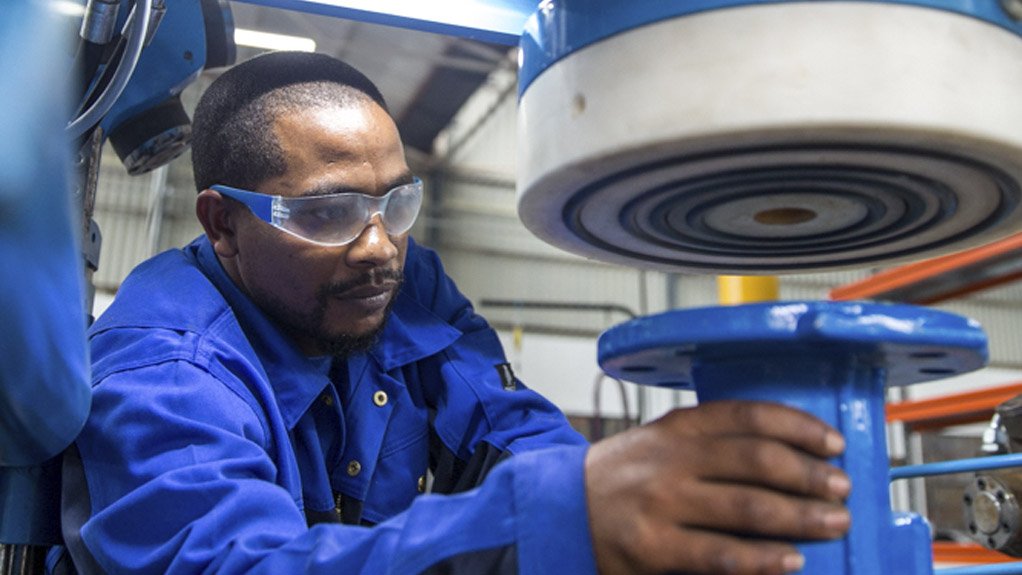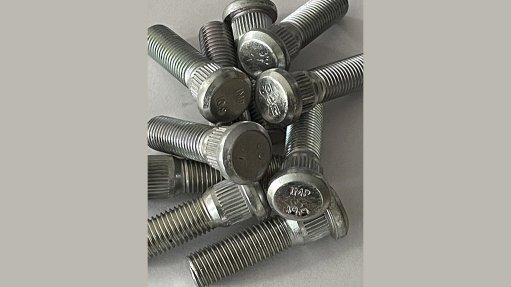Best practice guideline aims at enabling global competitiveness



VICTOR MANAVHELA The best practice guideline has been well received by the valves manufacturing industry
COMPETITIVE EDGE Valves companies that participated in the 2014/15 RECP assessment identified potential energy saving of 35%
National resource efficiency programme the National Cleaner Production Centre of South Africa (NCPC-SA) has released its resource efficiency and cleaner production (RECP) best practice guideline for the South African valves manufacturing industry.
The objectives of the guideline are to ensure that the local valves industry can compete on a global scale, reduce production costs by optimising processes and reduce energy consumption.
NCPC-SA Gauteng regional manager Victor Manavhela explains that the local valves industry body Valve and Actuator Manufacturers Cluster of South Africa (Vamcosa) partnered with the NCPC-SA, a Department of Trade and Industry initiative in 2014, by enlisting its members in the RECP assessment programme. He notes that 11 Vamcosa members and valves manufacturers participated in the RECP assessment programme during 2014/15, which ultimately led to the formation of the best practice guideline, which has since become accessible to industry.
“The in-plant assessments identified areas of improvement in the manufacturing process, including methods of reducing water and electricity consumption, means of sourcing or enhancing materials and methods to reduce or reuse industrial waste.
From the RECP assessment reports, we . . . identified recurring and, therefore, key areas for RECP interventions in valves manufacturers, which led to the establishment of the guideline,” Manavhela explains.
The interventions laid out in the guideline focus on energy efficient lighting, optimum tariff structure, power quality and power factor, compressed-air system optimisation, efficient motor systems, air pollution, water quality and water efficiency, waste management, and monitoring and targeting.
Manavhela points out that the nine interventions correlate with the four assessment focus areas of water, energy, waste and materials.
The implementation of energy efficient lighting will reduce electricity costs, while the tariff structure examines methods of reducing or avoiding unnecessary costs, such as reassessing peak demand management. The interventions also focus on the optimisation of power consumption, while the sections on compressed air and motor systems consider optimising use and ensuring minimal waste.
In terms of water quality and water efficiency, he states that the capability and willingness to manage water consumption has become a necessity, not only because of municipal restrictions and associated cost implications but also the good of South Africa, which has always been a water-scarce country.
“The recent and seemingly ongoing drought has ensured that managing water consumption is of vital importance. Manufacturers need to establish the quality of water required for their processes and look for ways to reuse or recycle grey or industrial water where possible. This will reduce the strain on municipal and provincial reserves, while reducing costs . . .”
Further, he notes that companies can reduce water losses significantly by repairing leaks.
In terms of waste management, the guideline points to methods of disposing or reusing waste, while the monitoring and targeting sections recommend that manufacturers implement and maintain a monitoring and targeting system for key utilities. He notes that each saving achieved by the implementation of the methods outlined in the best practice guideline is cumulative, adding that the adoption of these best practices should, therefore, be undertaken holistically.
He adds that the guideline, while predominantly shaped by the collaboration between Vamcosa and the NCPC-SA, also benefited from collaboration with other national programmes that are hosted, together with the NCPC-SA, at the Council for Scientific and Industrial Research, including the Technology Localisation Implementation Unit (TLIU) and the National Foundry Technology Network (NFTN).
“The current collaboration between the entities is such that the NCPC-SA can assist in reducing production costs by providing recommendations based on the RECP assessments. Meanwhile, the TLIU can assist companies in attaining international accreditation while allowing for access to newer technologies that might benefit their manufacturing processes,” notes Manavhela.
He says the NFTN can provide access to a national network that offers practical and theoretical knowledge, specifically to benefit the castings industry and, therefore, associated industries, including the valves industry.
Since the establishment of the NCPC-SA and the acknowledgment of its methods, local manufacturers have enhanced their competiveness and can access new opportunities and markets. Manavhela comments that “for example, the valves companies that participated in the 2014/15 RECP assessment . . . identified potential energy saving of 35%.”
Manavhela notes that the NCPC-SA intends for this guideline to provide an “off-the-shelf solution” for manufacturing companies in the valves industry. He notes that the guildeline is easy to use, ensuring that any operations manager in any part of the country can understand and attempt to implement the recommendations.
He says the guideline has been well received by the valves industry, adding that it is available for free on request from the NCPC-SA or can be downloaded from the centre’s website.
He also acknowledges the work of NCPC-SA project manager Thembi Kodisang Sibanda, without whom the realisation of the guideline would not have been possible
.Article Enquiry
Email Article
Save Article
Feedback
To advertise email advertising@creamermedia.co.za or click here
Announcements
What's On
Subscribe to improve your user experience...
Option 1 (equivalent of R125 a month):
Receive a weekly copy of Creamer Media's Engineering News & Mining Weekly magazine
(print copy for those in South Africa and e-magazine for those outside of South Africa)
Receive daily email newsletters
Access to full search results
Access archive of magazine back copies
Access to Projects in Progress
Access to ONE Research Report of your choice in PDF format
Option 2 (equivalent of R375 a month):
All benefits from Option 1
PLUS
Access to Creamer Media's Research Channel Africa for ALL Research Reports, in PDF format, on various industrial and mining sectors
including Electricity; Water; Energy Transition; Hydrogen; Roads, Rail and Ports; Coal; Gold; Platinum; Battery Metals; etc.
Already a subscriber?
Forgotten your password?
Receive weekly copy of Creamer Media's Engineering News & Mining Weekly magazine (print copy for those in South Africa and e-magazine for those outside of South Africa)
➕
Recieve daily email newsletters
➕
Access to full search results
➕
Access archive of magazine back copies
➕
Access to Projects in Progress
➕
Access to ONE Research Report of your choice in PDF format
RESEARCH CHANNEL AFRICA
R4500 (equivalent of R375 a month)
SUBSCRIBEAll benefits from Option 1
➕
Access to Creamer Media's Research Channel Africa for ALL Research Reports on various industrial and mining sectors, in PDF format, including on:
Electricity
➕
Water
➕
Energy Transition
➕
Hydrogen
➕
Roads, Rail and Ports
➕
Coal
➕
Gold
➕
Platinum
➕
Battery Metals
➕
etc.
Receive all benefits from Option 1 or Option 2 delivered to numerous people at your company
➕
Multiple User names and Passwords for simultaneous log-ins
➕
Intranet integration access to all in your organisation



















